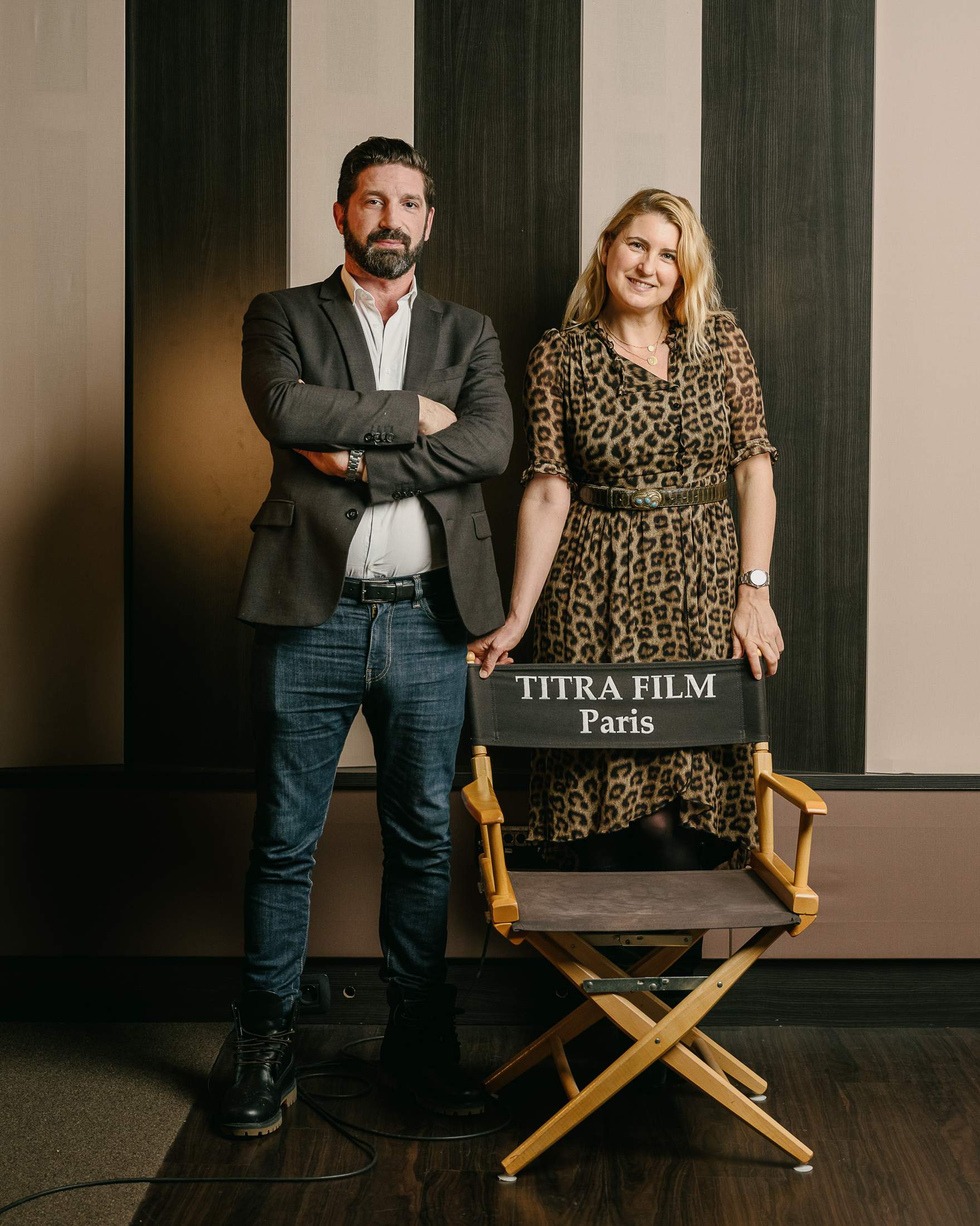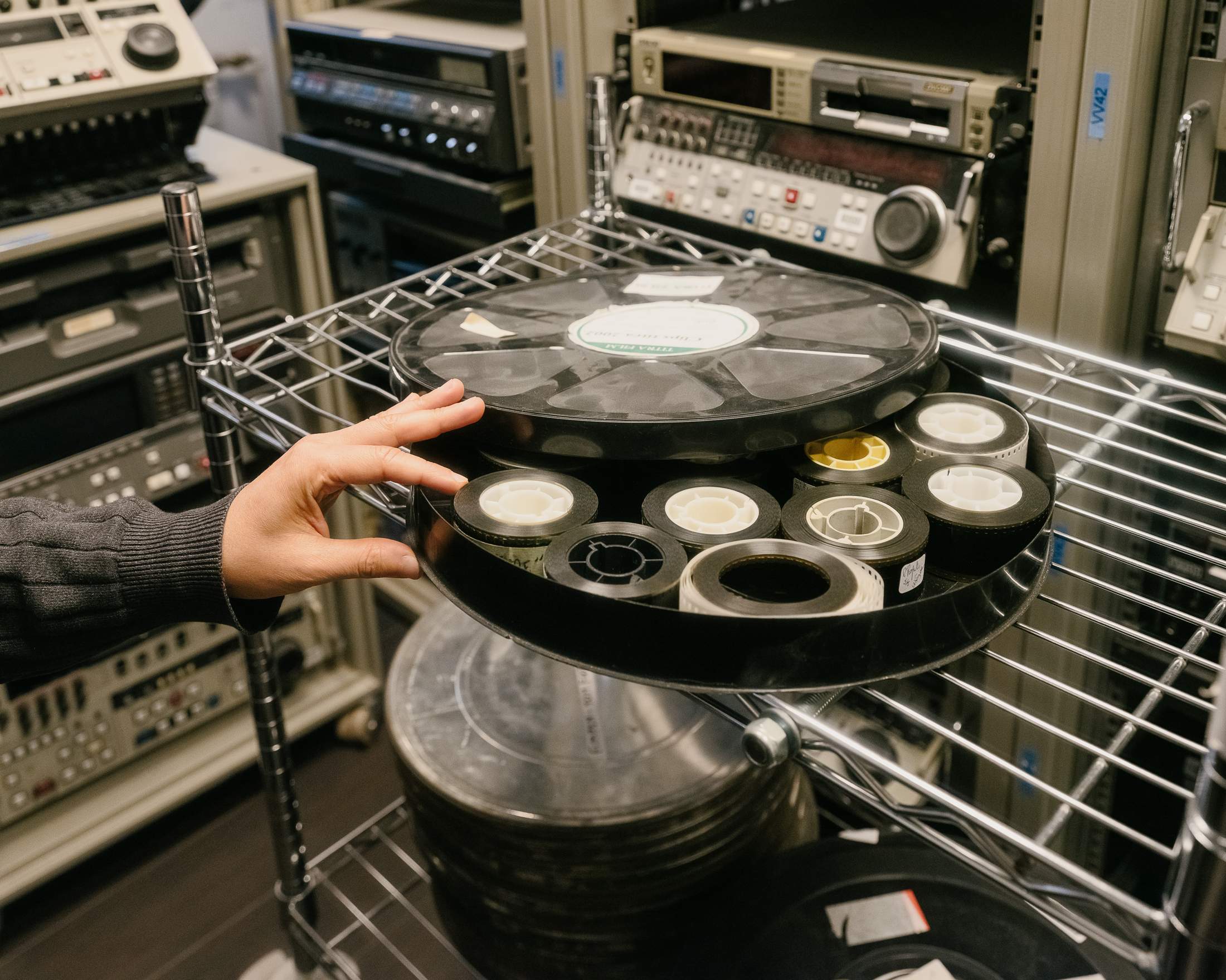Culture / Paris
Syncing feeling
As programmes such as ‘Squid Game’ and ‘Narcos’ capture imaginations worldwide, dubbing has become something to shout about. We meet a family-run firm giving foreign-language film a voice.
In a dubbing studio in Saint-Ouen, just outside Paris, a screen shows a scene from a US thriller. Two blonde women on a porch are poised to toast with champagne. A French translation of the characters’ dialogue runs quickly across the “rhythmo band”, a script that is synced to indicate the exact point at which the phrase should be uttered to ensure a perfect lip sync. The actor dubbing the older woman delivers the line into the microphone with an energetic arm gesture, as though holding a glass herself. “santé!” she says. But the word doesn’t quite fit with “cheers”. “Let’s try ‘chin’ instead,” suggests the director. One more take and “formidable!”; it’s a wrap.

Titrafilm’s David and Sophie Frilley

Subtitles are stamped directly onto the film strip
Localisation, the business of adapting films for international audiences, is thriving. Part of the rise in its fortunes is due to the great shooting stoppage of the pandemic, which forced countries to feed off other markets’ pre-existing productions. But mostly it’s thanks to the trend of streaming platforms trying to reach viewers around the world. France has the world’s largest dubbing industry and, according to industry body Ficam, the turnover for these kinds of services has seen a steady increase since 2015. Though more expensive, dubbing remains more accessible to mass audiences than subtitling, so platforms are investing in it heavily. In the UK and the US, where the practice used to be shunned, huge audiences are watching dubbed TV shows for the first time thanks to series such as Money Heist, Narcos and Squid Game.
Titrafilm is one of the oldest companies in this “behind-the-scenes” line of work. Founded by Russian immigrants Joseph and Michel Kagansky in 1933, the company pioneered the subtitling process with a technique that involved stamping titles directly onto a film strip: a cheap solution that allowed the first “talkies” to be distributed all over the world. Its first client was Howard Hawks for the subtitling of Scarface. Since then, the company has subtitled most of the films shown at Cannes Film Festival, given voices to much-loved cartoons such as Despicable Me, and even organised a private screening for Charlie Chaplin.

Voice actors hard at work

Titrafilm’s headquarters
Still a family business, Titrafilm is now in the hands of fourth-generation owner David Frilley-Kagansky and his sister-in-law Sophie Frilley, who have steered the company through its biggest changes since its foundation. Recently it has gone from working mostly for major film studios and TV stations to signing its biggest contracts with Apple, Netflix and Disney+, things that “would have been unthinkable 10 years ago,” says David. But adapting to an industry so closely linked with technological development is anything but easy. The digitalisation of films suddenly made its analogue expertise obsolete and by the early 2010s the company was struggling to survive. “We knew there was a revolution coming but nobody knew which tools we’d need,” says Sophie. “Within a couple of years our turnover was completely wiped out.” The company embarked on a full digital transformation, reinforced cyber security to ensure its clients’ trust and took the plunge into dubbing. It paid off: in 2016, it won a special César award (the French Oscar) for its innovation efforts.
Lost in translation
Worst-dubbed films A bad lip sync is always memorable. For infamous examples, look to the Sergio Leone western classic A Fistful of Dollars (dubbed in post-production because many actors didn’t speak English) or Orson Welles’ take on Franz Kafka’s The Trial, where Welles himself dubbed 10 of his characters.
Most-dubbed films
Perhaps unsurprisingly, many of the most-dubbed films in history are animations (children have less patience than adults with subtitles). But the feature topping the list is 1979’s Jesus, with more than 1,000 translations.
“There was a revolution coming but nobody knew which tools we’d need”
Today the economic shortfalls are a thing of the past, which is why Titrafilm’s HQ (a stone’s throw from the Luc Besson-supported Cité du Cinéma) is undergoing an expansion, including 10 more studios as well as a terrace with an outdoor cinema. According to Sophie, the company’s success lies in the longstanding work of its “dubbing auteurs”, experts in the complex task of translating films. “Some competitors have the same technical skills but call on translators and impoverish the work from a linguistic point of view,” she says. “It’s this quality that has allowed us to preserve our profession until now.” With the winds of change in its favour, Titrafilm is poised to do much more than just survive.
titrafilm.com


